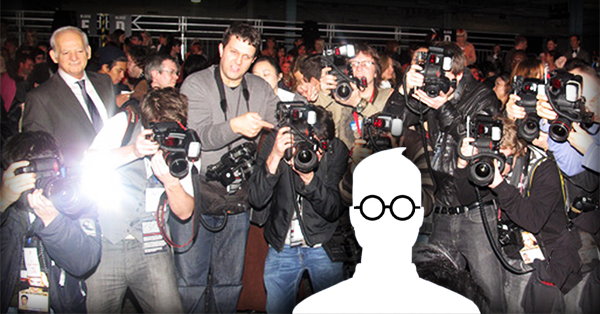
 Are you eyeing a top industry conference in your niche?
Are you eyeing a top industry conference in your niche?
For tech, maybe it's South by Southwest. For social, it's Social Media Marketing World or SocialFresh.
And for startups, it's TechCrunch Disrupt.
Attending these events is a blast -- but also a big investment for small businesses. A booth in Startup Alley at TechCrunch Disrupt costs $1,500 a day!
So if you're lucky enough to attend one of these high-profile affairs, you shouldn't squander the chance to meet the bigwigs in your industry & tell journalists your story.
Easier said the done, right?
Networking with the media can seem daunting -- especially if you're not an extremely social person.
How do you strike up a conversation with a reporter you've never met?
Answer: it's all about preparation!
Focus on these 3 phases of event PR to get as much press coverage as you can at your next industry conference:
- Before the event
- During the event
- After the event
In this post, I present tips for maximizing your public relations efforts in each of these categories.
How to Get Press Coverage for Your Business at a Conference
How do you stand out at a conference & get the attention of reporters?
“Sometimes you have a booth, sometimes you don’t. Sometimes you’re speaking, sometimes you’re not. So what can you do?” said Ben Kaplan, a PR pro who runs San Francisco-based PR Hacker, an agency that specializes in generating press coverage for startups & small businesses.
1. Before the Event
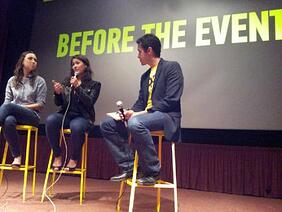 Samantha O'Keefe, Melissa Joy Kong & Ben Kaplan discuss event public relations at a panel in San Francisco.
Samantha O'Keefe, Melissa Joy Kong & Ben Kaplan discuss event public relations at a panel in San Francisco.Set goals you'd like to accomplish at the conference -- and write them down.
>> Click to Tweet <<
“Think about who you want to talk to while you’re there, and what would be a success after the event,” said Samantha O'Keefe, Startup Battlefield editor for TechCrunch.
Different conferences offer different opportunities to get covered in different ways.
“When you get press you should be really cognizant of what the purpose of that press is,” O'Keefe said. “Sometimes it can be general consumer awareness, in which case, getting on the Today show is your goal. But often times it’s a little bit more targeted than that.”
And your business will need different types of press at different times.
An article in TechCrunch can be great for raising money, but eventually you need consumers of more mainstream media to know about your company. That's where newspapers & television stations come in handy.
Ask yourself these 3 questions before you attend a conference:
- Which journalists do you want to meet?
- What type of press coverage do you want to get from the conference? (this could be TechCrunch or USA Today)
- Which journalists do you want reporting about your company?
Memorize a few 1- to 3-minute newsworthy pitches that include different angles for telling your company's story. And make sure each member of your team knows the pitches before they attend the show.
>> Click to Tweet <<
The stories shouldn't be too promotional. Think about the articles journalists write & pitch something newsworthy that'll get them interested in your product.
“Nobody cares about your product as much as you care about your product,” said Melissa Joy Kong, content strategist at Eventbrite.
>> Click to Tweet <<
She suggested practicing coming up with story ideas by focusing on someone else's company.
“Find a startup that you don’t work at and come up with pitch ideas for them,” Kong said.
 That's a great way to hone your media outreach skills.
That's a great way to hone your media outreach skills.
“A lot of this stuff is really fundamental, you don't have to be a PR expert,” she said.
You have to think like a journalist. How can you give them an interesting story?
Remember some of the basic elements of news:
- Timeliness
- Proximity
- Relevance
- Human interest
Kong said there are 3 things you DON'T HAVE TO BE to get strong press coverage for your business:
- You don't have to be a PR expert
- You don't have to be great at pitching people
- You don't have to be "super-extroverted"
"Remember that you're talking to humans," she said.
Kong was a journalist. And as a journalist, there were a couple things she looked for when someone pitched her in the run-up to an event:
- Subject line or first sentence of email referenced someone she "has a warm connection" to
I always pay attention to that because it's relationship based.
- You've researched her work & the publication she writes for
"Sometimes it's very hard to remember what it's like to be an outsider who is looking in on your product and thinks the name of your company is funny or your product is complicated," Kong said. "Keep it simple and remember that stories matter more than product."
How Soon is Too Soon
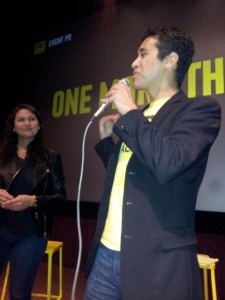 PR pro Ben Kaplan said the best time to pitch a journalist about a conference is within 2 to 4 days of the start of the event.
PR pro Ben Kaplan said the best time to pitch a journalist about a conference is within 2 to 4 days of the start of the event.So how long before a conference should you tell reporters that you plan to attend?
During a panel discussion in San Francisco, Kong, O'Keefe & Kaplan agreed that the sweet spot is between 2 and 4 days prior.
“We like to make sure we've pitched them before they go, before they’re there,” Kaplan said.
There is too much noise at the conference itself for this to be the first time they are getting introduced to you.
If your first contact with a reporter is at a big conference, "it’s generally too late,” Kaplan explained.
>> Click to Tweet <<
"Pitch them before they go," he said.
But don't pitch too far in advance.
2. During the Event
How do you stand out in room full of people who are all clamoring for attention?
"For me it comes down to companies that are well prepared with who they want to meet," O'Keefe said. "Events are an opportunity for people to really get to know you as a company."
The most successful companies make a list of journalists they want to visit with at the conference.
>> Click to Tweet <<
And if you have a booth -- make it interactive.
Have an activity at your booth.
And talk to folks from all the hot companies.
Watch what they do, how they position their story & how they talk about it
Find the interesting story about your company & be creative, Kong said.
"People usually don't remember products, they remember stories," she added.
>> Click to Tweet <<
Use a conference as a chance to start a close relationship with a journalist. Learn about:
- Who they are?
- How they think?
- What their struggles are?
- What weighs heavy on them?
“Some of the best PR coverage I've ever gotten from any of the stuff that I've done has come when I really take take time to get to know a journalist from scratch," Kong said. “That takes a little bit longer but it's so much more meaningful & will carry over.”
Get the media list for the conference or research who covered the event the year before so you know who to contact.
>> Click to Tweet <<
"What I think is important for event PR is starting to think like the journalist so you can give them a great story," Kong said.
And you don't have to have a booth to make a splash with the media.
Product demonstrations are often scheduled in a conference room or back at your hotel. Try scheduling demonstrations in advance -- before you arrive at the conference.
And force yourself to talk to reporters by setting goals to pitch a set number of people before lunch.
3. After the Event
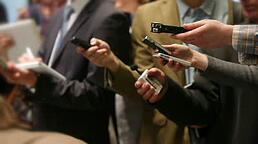 You should follow up with journalists within a few days after the conference if you expect to land on their radar screens.
You should follow up with journalists within a few days after the conference if you expect to land on their radar screens.
>> Click to Tweet <<
Kaplan recommended contacting reporters within 2 to 4 days of the conference ending. And know the best times to pitch each journalist.
Sometimes an email early in the morning will land you a spot on a morning show. But many bloggers prefer to be pitched on the weekend.
"The right pitch to the right person will fail if not delivered at the right time," Kaplan said.
Try not to pitch a journalist who is near a deadline.
Where to Pitch
When deciding where to pitch a reporter -- remember that email & Twitter are often the preferred forms of communication.
>> Click to Tweet <<
Some journalists pick up the phone every time while others let calls go to voice mail.
"The reason we like email is because if you pitch the wrong person, it's a means to get it forwarded," Kaplan said. "You don't have to be 100 percent perfect on your pitch & it can still get to the right person."
O'Keefe recommended contacting journalists on multiple platforms. Just make sure you're pitching the right people -- the journalists who report about companies like yours.
"Don't be tempted to blanket email everyone at an organization," O'Keefe said.
If they see the same startup pitch come in to 6 or 7 inboxes, that is not good, no matter how good your company is.
Use several story ideas to pitch journalists on different beats: business, lifestyle, health, etc.
Leverage Existing Press
Any coverage you received before or during the conference should be leveraged after you get home:
>> Click to Tweet <<
- Put the media outlet's logo on your website
- Share the article on social media
- Write a blog post about the experience
This will help you parlay coverage from niche publications into exposure for your company in the mainstream press.
Key Takeaways
 In closing, I'll review the 3 phases of event PR:
In closing, I'll review the 3 phases of event PR:
- Before the event
- During the event
- After the event
And here are some helpful tips to remember during each phase:
Before the Event
- Set goals for the event
- Begin contacting journalists 2 to 4 days in advance
- Brainstorm story ideas about your company
- Memorize a few 1 to 3-minute pitches
- Make sure your entire team is on message
During the Event
- Have an activity at your booth
- Perform product demonstrations for individual reporters
- Build relationships with journalists
- Have a goal to pitch a set number of journalists before lunch
After the Event
- Follow up with journalists within a few days of the event ending
- Pitch the right reporter at the right time
- Leverage existing press
Most importantly, DON'T GET DISCOURAGED.
Rejection is part of public relations. When somebody tells you no or doesn't respond, learn from the experience & next time send a better pitch.
>> Click to Tweet <<
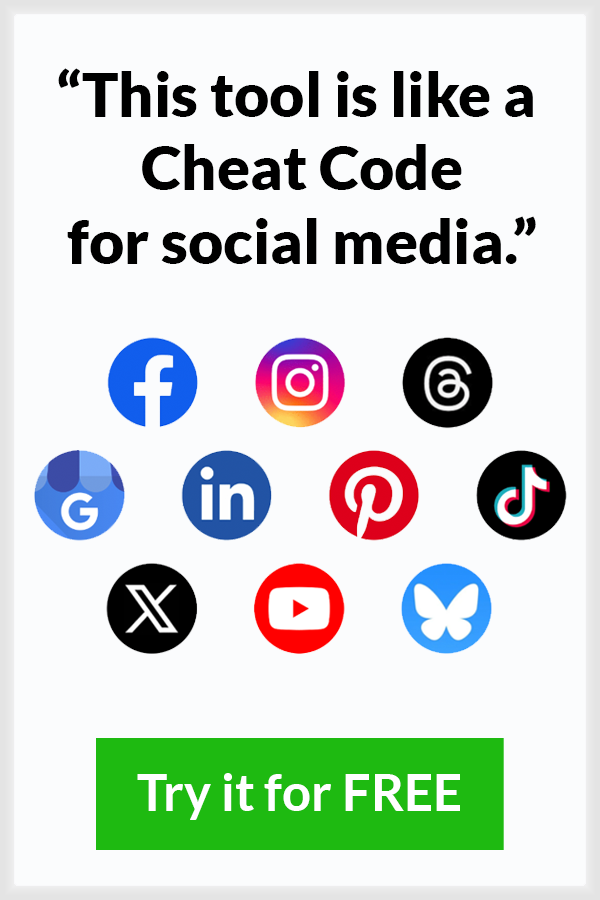





No Comments